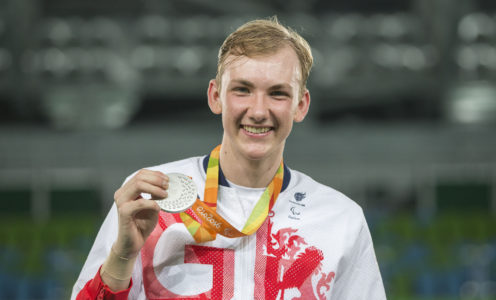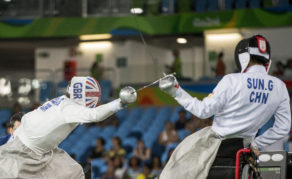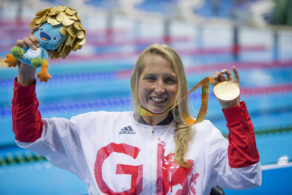Rio 2016: Silver lining as Piers Gilliver ends GB’s wait for wheelchair fencing medal

University of Bath-based Piers Gilliver became the first British wheelchair fencer in 24 years to win a Paralympic Games medal when he took silver at Rio 2016 on Tuesday.
Gilliver, who celebrates his 22nd birthday on Saturday, only missed out on the gold medal by a couple of points after being edged out 15-13 by China’s Sun Gang in a tense Category A epee final in the Carioca Arena.
“I really wanted the gold but he was the better athlete on the day,” said Gilliver, who was also narrowly beaten by Sun in the World Championships 12 months ago.
“Still, a Paralympic medal is a real dream and he’s such a tough competitor. It’s my first Paralympics and I thought I coped well with the pressure and really excelled.”
Gilliver topped the qualification rankings for Rio 2016 after winning a succession of medals on the international stage, including a host of World Cup and Grand Prix titles.

He eased through the preliminary rounds, topping Pool 1 after winning all five of his bouts, and was then the first to book his semi-final place with a 15-11 defeat of Italy’s Matteo Betti.
Iraq’s Zainulabdeen Al-Madhkhoori provided a test in the semi-finals but Gilliver came from behind to win 15-10 and set up a rematch of last year’s World Championships final.
That contest was won 15-14 by Sun and this gold-medal showdown was equally close-fought. However, the Chinese fencer held a narrow advantage throughout as Gilliver’s determined challenge came up just short.
Gilliver has been based at the University of Bath for the past 18 months. As well as training with his lead coach, Peter Rome, he also spars with Bath Sword Club and the Pentathlon GB squad in the Sports Training Village fencing salle.
He will be back in the Carioca Arena on Wednesday as he competes in the men’s Category A foil competition.
“I’ve got the foil to focus on now and there’s no reason to think a medal isn’t possible, even if my ranking isn’t that high,” Gilliver added.
He is the second University of Bath-based athlete to win a medal at Rio 2016 after Nicole Walters guided Melissa Reid to PT5 bronze in the para-triathlon.

Natural Sciences graduate Alexandra Rickham and partner Niki Birrell moved into the medal positions in the two-person keelboat SKUD18 by finishing fourth in the only race of a weather-affected second day of the sailing regatta.
That lifted the London 2012 bronze-medallists up to third in the overall rankings and Rickham said: “It could be a big day [on Wednesday]. It should be a lot cooler, which will be a lot more comfy, and we are gunning for it.
“That is all we can do at the moment. We will just see how the scorecard plays out and work our way up as we can.”
Former University of Bath-based swimmer Stephanie Millward won the first gold medal of her Paralympic career on Tuesday after finishing more than four seconds clear of the field in the S8 100m backstroke.
“It’s amazing – three Paralympic Games, 18 years of multiple sclerosis and here I am with that gold medal I’ve been striving for, for so long,” said Millward, who set a new Paralympic record of 1:13.02.
Ellie Simmonds, who received an honorary Doctor of Laws degree from the University of Bath in 2013, won her third medal of the week by taking bronze in the S6 400m freestyle.
Click here to keep up to date with the Rio 2016 Paralympic Games news and schedules.




